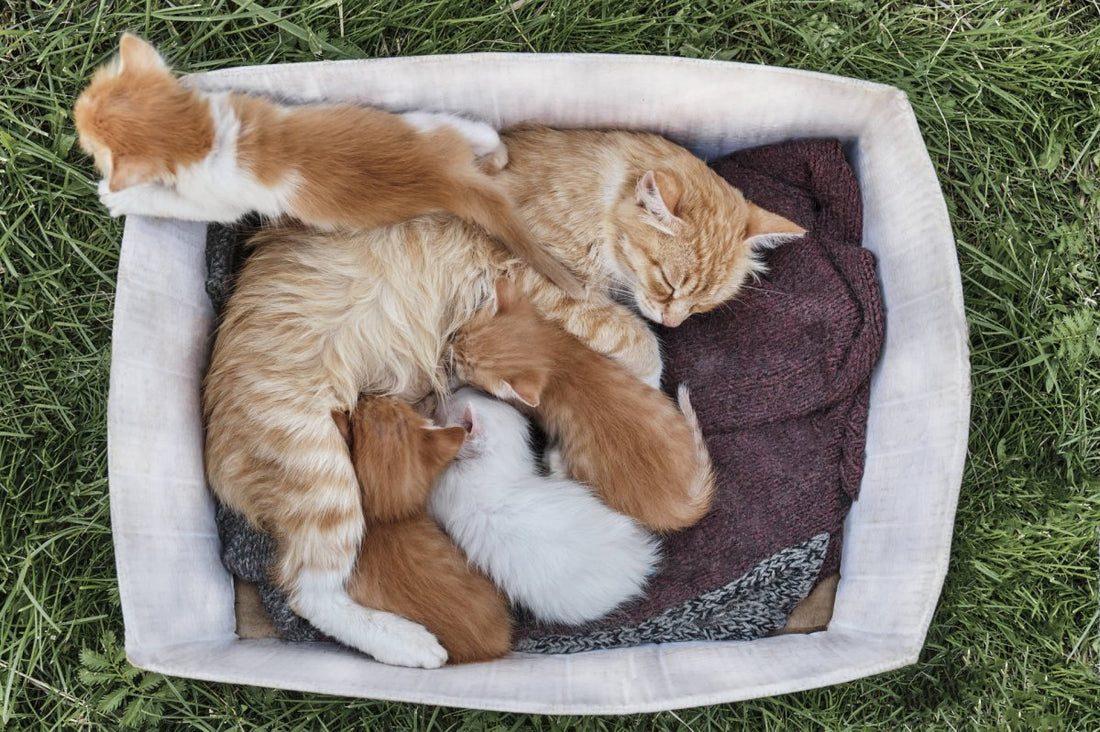Cat is pregnant: Everything you need to know now
A pregnant cat is an exciting experience—for both you and your furry friend. But how do you know if your cat is pregnant? How long does the pregnancy last, and how can you help your cat during this special time? In this blog post, you'll find all the answers and helpful tips to keep your cat happy and healthy.
Signs: How do you know if your cat is pregnant?
Cats are masters at initially hiding their pregnancy. However, there are clear signs that indicate your cat is pregnant.
The most important signs of a pregnant cat:
- Enlarged teats: From the 2nd to 3rd week, the teats turn pink and become larger.
- Changed appetite: Your cat suddenly eats more or less.
- Round belly: From about the 4th week, the belly begins to bulge.
- Behavioral changes: A pregnant cat often becomes more affectionate or quieter.
- Weight gain: After a few weeks, your cat will visibly gain weight.
When can you tell if your cat is pregnant?
The first external signs usually appear from the third week onward. From the fourth to fifth week, pregnancy is clearly visible through a rounded belly.
How long are cats pregnant? The duration of pregnancy
Pregnancy in cats lasts an average of 63 to 65 days , or about 9 weeks. The exact duration can vary slightly depending on the cat's health and age.
The stages of pregnancy:
- Weeks 1–2: Fertilization and first implantation of embryos.
- Weeks 3–4: First signs such as pink teats and weight gain appear.
- Weeks 5–6: The abdomen grows visibly; the fetuses are visible on the ultrasound.
- Weeks 7–8: The cat rests more, her appetite increases, and she prepares for birth.
- Week 9: The birth is imminent. The cat seems restless and is looking for a place to give birth.
Proper care for a pregnant cat
During pregnancy, your cat needs special attention and care to stay healthy and ensure optimal development of the kittens.
1. Nutrition:
- High-quality food: A balanced diet with high nutrient content is crucial.
- More calories: Feed your cat kitten food from the 5th week onwards – this provides additional energy.
- Fresh water: Make sure your cat always has access to fresh water.
2. Rest and relaxation:
- A quiet retreat: Your cat needs a cozy, undisturbed place.
- Avoid stress: Avoid noise and hectic situations.
3. Veterinary visits:
- Regular check-ups: Have your veterinarian confirm pregnancy and monitor your health.
- Vaccinations: Vaccinations and deworming should be completed before pregnancy.
Birth preparation: How to prepare your cat
Shortly before giving birth, your cat will show signs that she's about to give birth. Here's how you can help.
Signs of impending birth:
- Nest building: Your cat is looking for a quiet place to give birth.
- Restlessness: She appears restless, meows more often and grooms herself intensively.
- Loss of appetite: Many cats stop eating shortly before giving birth.
- Belly drop: The kittens slide deeper into the birth position.
What you should prepare:
- A whelping box : A box or basket with soft blankets provides the perfect birthing place.
- Towels and cloths : For cleanliness during childbirth.
- Veterinarian's phone number : Keep it handy in case of emergency.
The Birth: What Happens When Your Cat Gives Her Kittens?
Birth usually proceeds without complications. Your cat instinctively knows what to do. Nevertheless, you should be prepared for emergencies.
The process of birth:
- Contractions begin: Your cat begins to writhe and strain.
- First kittens arrive: After the pushing phase, the first kitten arrives. Others follow at intervals of 10–60 minutes.
- Afterbirth: After each kitten, the afterbirth is excreted.
- Cleaning: Your cat licks the kittens clean and bites through the umbilical cord.
Frequently asked questions about pregnancy in cats
“Can I pet my pregnant cat?”
Yes, as long as she allows it. Many pregnant cats enjoy extra attention.
“How many kittens does a cat have?”
On average, a cat has 3–6 kittens per litter.
“What to do if labor stalls?”
If labor lasts longer than 2 hours without a kitten being born, you should contact your veterinarian immediately.
“Can a cat still go into heat during pregnancy?”
Yes, it is rare but possible for a cat to go into heat again during pregnancy.
Conclusion: Optimal support for a pregnant cat
Your cat's pregnancy is an exciting and special time. With proper care, preparation, and a good understanding of her needs, you can navigate this phase smoothly. Here are the key points:
- Recognize the signs: The first physical changes become apparent from the 3rd week.
- Duration of pregnancy: About 63–65 days.
- Care: High-quality food, rest and regular vet visits.
- Birth preparation: A quiet whelping box and your support are crucial.
Stay patient and attentive—your cat will thank you, and soon you'll be a proud "cat grandparent"! 🐱



